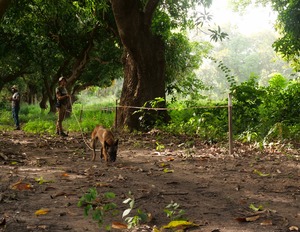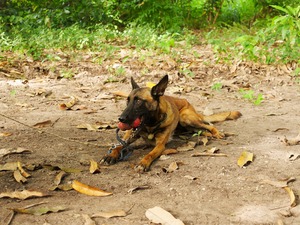Kira, Storm, Fisti and Tini: meet our new demining colleagues in Senegal
Nose to the wind and eyes sparkling, the four dogs are training in the luxuriant vegetation of Casamance. Soon, they will be clearing mines alongside HI’s teams.

Basher Issa Al-Majali and Storm are training to detect explosive devices in Casamance, Senegal. | © A. Stachurski / HI
This is the first time that HI and APOPO have worked together in Senegal. For the four demining dogs in the team, this is a big change and they need some time to acclimatise. With their handlers, Basher and Enrique, and after a break of around fifty days, they are now finishing their months-long training. Soon, they will be assisting HI's deminers in the field to make Casamance safer.
Acclimatising the dogs to their new environment
Kira, Storm, Fisti and Tini are Belgian Shepherds. Since they were puppies, they have been trained by APOPO, HI's partner specialised in animal detection in the demining process, to become dogs who detect explosives. Their keen sense of smell enables them to sniff out explosive devices, while their light weight and strict training keep them safe from explosions.
The four dogs come from Bosnia and this is their first time working in Senegal. They are used to cooler temperatures and so adapting to the heat of Casamance is tough. They need time to acclimatise, get used to their new environment and bond with their handlers.
“The heat is an obstacle. If it’s over 35°C, we stop work. The role of the handler is to be attentive to whatever signs the dogs show. Visual control is very important, so they mustn’t go into places where we see them, like behind bushes. Here, the vegetation is very thick and can hide many dangers - rubbish, broken glass, but also snakes and scorpions. Whenever we see something moving in the grass, we leave the area for a while and work somewhere else so as not take any risks," explains Mohammad Alkhlaifat, APOPO's team leader.
The training will soon be complete. Before long, APOPO's handlers and dogs will have obtained the final certification from the Senegalese national authority and will join HI's demining teams in the field.
"We can't wait for the dogs to arrive. They're our new colleagues – that’s what we're calling them!" says Elisabeth, a deminer and community liaison officer at HI, with a smile.
Dogs: a considerable asset in mine clearance
 Every morning, Basher and Enrique start by inspecting the dogs - eyes, nose, body – to they make sure none of the them has a wound or fever. The handlers guide two dogs each. As soon as they are deployed, the dogs will work for 3 to 4 hours, each inspecting a minimum of 200 m² of land per day.
Every morning, Basher and Enrique start by inspecting the dogs - eyes, nose, body – to they make sure none of the them has a wound or fever. The handlers guide two dogs each. As soon as they are deployed, the dogs will work for 3 to 4 hours, each inspecting a minimum of 200 m² of land per day.
"We move along corridors facing different directions, because the dogs can't work with the wind at their backs," explains Mohammad.
As soon as they detect a suspect odour, the dogs sit down at least one metre away and point towards the source with their nose - aware that they must remain focused on their objective and not let themselves be distracted. Then it's the turn of HI's deminers to step in. They will inspect the zone, identify the object and, if it proves to be an explosive device, defuse it. Because, although the dogs can smell odours, they have no way of knowing what is causing them. This means that they sometimes detect objects that are harmless but contain components used in certain explosives, such as plastic. Other times, the indications they give are false because the wind has carried the odour away from its source.
"We work with animals and it's impossible to know what they're thinking. We need a lot of concentration and attention to read the dogs' behaviour. For example, some dogs will sit down as soon as they smell something suspect, while others will keep going until they find the exact location of the object," explains Mohammad.
Taking into account external parameters such as wind direction and strength is therefore essential. Moreover, to guarantee the quality of the work carried out, the areas inspected by one dog-handler team are checked by another team and vice versa, to make sure no explosive devices have been overlooked.
Everyday heroes
"You have to make sure the dogs are OK and motivate them to work. But they're not pets. You also have to be firm with them so that they obey and do their job properly," explains Basher Al-Majali.
 Kira, Storm, Tini and Fisti train with their guides every day. When they're not out in the field, they're exercising or swimming to keep fit. What motivates them? Their favourite dog toys, their precious Kongs. They are an integral part of the dogs’ daily lives, as being allowed to play with their toy is how the guides reward them when they do a good job.
Kira, Storm, Tini and Fisti train with their guides every day. When they're not out in the field, they're exercising or swimming to keep fit. What motivates them? Their favourite dog toys, their precious Kongs. They are an integral part of the dogs’ daily lives, as being allowed to play with their toy is how the guides reward them when they do a good job.
"These four dogs are very powerful and highly motivated; they make a perfect team for demining. But they're also very gentle, you have to speak to them gently," adds Enrique Arevalo.
Many lives depend on this work. Kira, Storm, Tini and Fisti, like all the APOPO dogs, will work for an average of ten years. But a day will come when they are tired. When this day arrives, APOPO will look for loving families who are prepared to give these exceptional dogs the home they deserve. But even retirement won't be all rest and relaxation for a demining dog. In their later years, they will still need plenty of exercise to expend all the energy and power that made them everyday heroes.
Senegal estimates the extent of contamination linked to the conflict in Casamance at 1,200,000 m² of land, spread over five departments. In May 2022, HI relaunched its demining operations in Casamance, where the organisation had already cleared more than 900,000 m² of land since 2008. HI's two current projects, ARC and BUZA, will enable to hand over 800,000 m² of land by 2025, helping to restore security and socio-economic prosperity to communities in the Ziguinchor and Sédhiou regions. These projects are funded by the European Union and the Dutch Ministry of Foreign Affairs.




